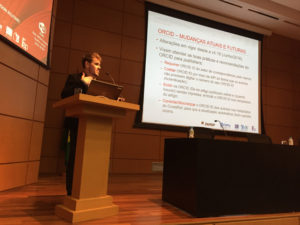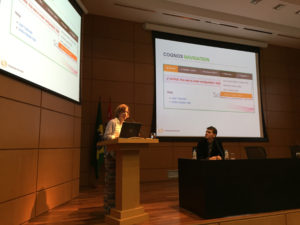By Alex Mendonça
The II SciELO-ScholarOne Updating Course took place on September 16, in FAPESP’s Governador Carlos Alberto de Carvalho Pinto Auditorium, in São Paulo. It was the second annual meeting of SciELO Brazil journals that use ScholarOne as an online system of manuscripts management. Circa 150 representatives of 81 journals, including editors-in-chief, members of the editorial boards and scientific communication professionals attended the training activity.
As an integral part of the development program of SciELO journals and lines of action on professionalization, internationalization and financial sustainability, the SciELO Program provides for more than a decade online tools of editorial flow management to its journals. Open Journal System (OJS), that has been offered since 2006, is the first option, and ScholarOne, offered since 2012, the second option. Both are available free of charge to SciELO journals.
So far, the program has trained editorial teams of 140 SciELO journals on the operation of ScholarOne. Of these, 120 operate the system regularly and another 20 are undergoing migration to the automated system. This number represents 42% of journals of the SciELO Brazil Collection.
The course had as main goals to balance the knowledge of system’s users, considering the frequent editorial staff changes of journals and to share novelties, best practices and recommendations aligned with SciELO indexing criteria and the state of the art on scientific publishing.
Totaling seven hours, the course content was based on the SciELO lines of action on Professionalization, Internationalization and Sustainability; the content has been organized into blocks according to these three themes.
The first block, dedicated to professionalization, included best practices, problem solving, usage tips, suggestions and recommendations of procedures that lead to time saving and improved manuscripts processing.
The Sustainability block focused on sustainable forms to use the platform, alternative solutions for the collection of submission charges and/or article processing charges and also stimulating the active participation of the journals in the continuous improvement of the system.
The block dedicated to Internationalization, on the other hand, was presented by Norma Roberts, a ScholarOne representative, who prepared a short course oriented to the statistics reporting tool usage, including step-by-step report building, which detailed the amount and percentage of foreign authors, reviewers and editors, enabling the journals to measure and to monitor their degree of internationalization.
In the days preceding the event, Norma Roberts paid a technical visit to SciELO Unit in São Paulo, where she worked with the SciELO team by conducting internal training activities and implementing improvements on ScholarOne websites used by SciELO journals.
An important point that has been discussed during the event was the processing time of manuscripts between submission and publication dates, which currently takes, on average, 12 months. The prospect is that journals will attempt to shorten this time to 6 months. Some proposals on how to achieve this goal have been presented, by adjusting the processing time frames in ScholarOne. A preliminary exercise with a similar proposal was made in 2015, in the first edition of the course, in which we succeeded to decrease the processing time of 14 out of 35 journals that had their processing times reduced. The time gain percentages ranged from 3.5% to 37.8%, with an average value of 7.4%. Thus, it is expected that the journals continue seeking to adjust their processes and deadlines to achieve a greater flexibility during manuscripts’ assessment.
Finally, the participants were informed first hand about the novelties expected in the next versions of ScholarOne. Many journals who attended the course have already started to implement the suggestions and recommendations made.
Considering the positive evaluation of the course, revealed by a query, and the successful experiences of the first course, the perspective is to continue to organize these meetings annually, always aligned with the SciELO Program’s principles and objectives.
References
MENDONÇA, A. and ALMEIDA, F. Sustentabilidade. In: II Curso de Atualização SciELO-ScholarOne, São Paulo, 2016. 24 slides. Available from: http://pt.slideshare.net/scielo/sustentabilidade-66225151
MENDONÇA, A. Profissionalização. In: II Curso de Atualização SciELO-ScholarOne, São Paulo, 2016. 81 slides. Available from: http://pt.slideshare.net/scielo/profissionalizao
MENDONÇA, A. ScholarOne e os Critérios SciELO. In: II Curso de Atualização SciELO-ScholarOne, São Paulo, 2016. 18 slides. Available from: http://pt.slideshare.net/scielo/scholarone-e-os-critrios-scielo
MENDONÇA, A. The advanced management of manuscript evaluations was the focus of the first ScholarOne refresher course at SciELO. SciELO in Perspective. [viewed 28 September 2016]. Available from: http://blog.scielo.org/en/2015/08/17/the-advanced-management-of-manuscript-evaluations-was-the-focus-of-the-first-scholarone-refresher-course-at-scielo/
PACKER, A.L. Online management of manuscripts is a required indexing criterion of SciELO. SciELO in Perspective. [viewed 27 September 2016]. Available from: http://blog.scielo.org/en/2015/04/01/online-management-of-manuscripts-is-a-required-indexing-criterion-of-scielo/
PACKER, A.L., MENDONÇA, A. and ALMEIDA, F. Flow of manuscripts and items processed by SciELO Brazil journals in 2014 and 2015. SciELO in Perspective. [viewed 27 September 2016]. Available from: http://blog.scielo.org/en/2016/09/23/flow-of-manuscripts-and-items-processed-by-scielo-brazil-journals-in-2014-and-2015/
PACKER, A.L., MENDONÇA, A. and ALMEIDA, F. The SciELO journals are being improved by the adoption of classic workflows relating to the online management of article submissions. SciELO in Perspective. [viewed 27 September 2016]. Available from: http://blog.scielo.org/en/2014/07/30/the-scielo-journals-are-being-improved-by-the-adoption-of-classic-workflows-relating-to-the-online-management-of-article-submissions/
ROBERTS, N. Understanding ScholarOne Reports. In: II Curso de Atualização SciELO-ScholarOne, São Paulo, 2016. 115 slides. Available from: http://pt.slideshare.net/scielo/mini-curso-cognos-construindo-relatrios-de-autores-pareceristas-e-editores-estrangeiros
External links
I SciELO-ScholarOne Updating Course – <http://eventos.scielo.org/iscielo-scholarone/>
II SciELO-ScholarOne Updating Course – <http://eventos.scielo.org/iiscielo-scholarone/>
ScholarOne Manuscripts – <http://scholarone.com>
Translated from the original in portuguese by Lilian Nassi-Calò.
Como citar este post [ISO 690/2010]:















Read the comment in Spanish, by Javier Santovenia Díaz:
http://blog.scielo.org/es/2016/10/05/perfeccionamiento-en-el-uso-y-nuevas-funcionalidades-del-sistema-dominaron-el-ii-curso-de-actualizacion-scielo-scholar-one/#comment-40094